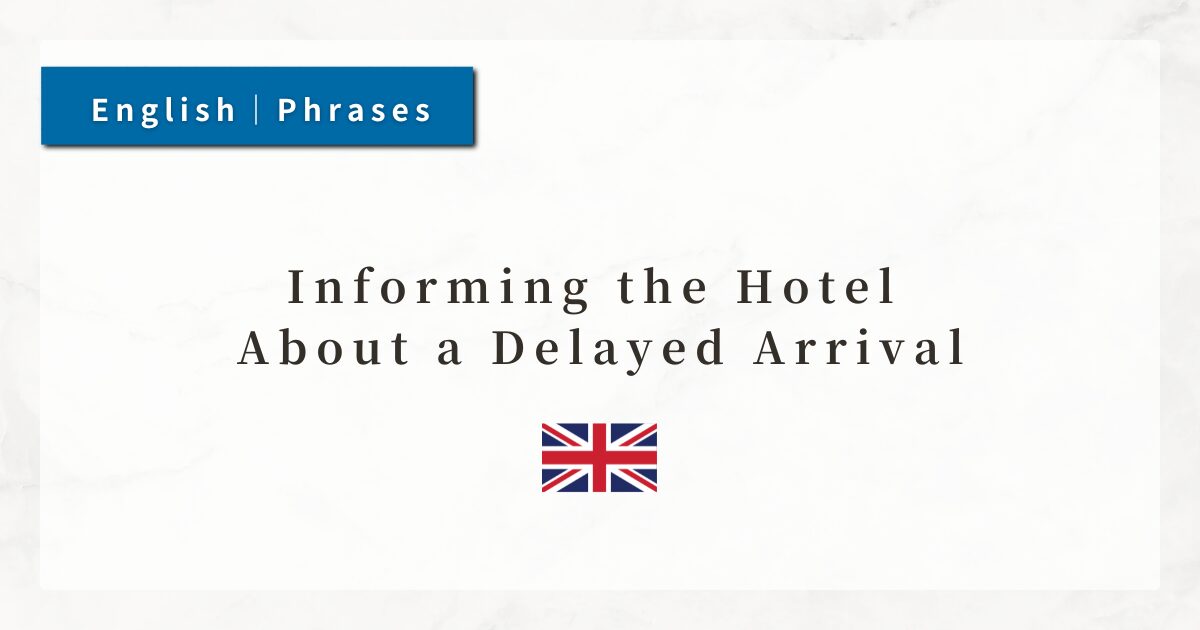#14 Informing the Hotel About a Delayed Arrival|Practical English Expressions

When traveling, there are times when I cannot arrive at the hotel at the scheduled time due to flight or train delays, or missed connections.
In such situations, contacting the hotel in advance helps prevent problems such as cancellations or being refused check-in.
In this lesson, I will introduce useful English expressions for informing a hotel about a delayed arrival, along with important grammar points.
Dialogue

Hello, this is Yuki Sato. I have a reservation for tonight.

Yes, Mr. Sato. How can I help you?

My flight has been delayed, so I’m going to arrive late.

I see. Do you know what time you’ll be arriving?

Around 11 p.m., if everything goes smoothly.

That’s no problem. We’ll keep your room.

Thank you very much.

You’re welcome. Have a safe trip.
1. Stating a Reservation
This phrase can be used in any reservation situation, whether at a hotel, restaurant, or train.
- I have a reservation for tonight.
“I have” expresses that I currently hold the reservation. The phrase “for tonight” specifies the time.
By replacing it with a date or day of the week, I can adapt it to various contexts.
- I have a reservation for tomorrow night.
- I have a reservation under the name of Tanaka.
The structure “for + date/time” appears frequently and is useful to memorize.
2. Explaining a Delay in the Present Perfect Passive
The present perfect tense (have/has + past participle) is used when a past event affects the present situation.
- My flight has been delayed.
→ “My flight” is in a delayed state caused by some reason.
When combined with the passive form (be + past participle), it expresses the idea of “being delayed.”
This phrase is common in formal contexts such as hotels, airports, and business.
Although “My flight was delayed” is grammatically correct, the present perfect form emphasizes its relevance to the current situation, making it more polite and practical.
3. Expressing an Expected Late Arrival
The structure “be going to + verb” is often used to describe future events that are expected or likely to happen.
- I’m going to arrive late.
→ Given the circumstances, my arrival will be delayed.
It is useful when I want to say, “It seems I will be late based on the current situation.”
4. Asking About the Arrival Time with Future Progressive
This question uses the future progressive (will be + -ing).
- Do you know what time you’ll be arriving?
→ A very polite way of asking about the expected arrival time.
The nuance is “At a certain time in the future, something will be in progress.”
Compared with “What time will you arrive?,” it sounds softer and more considerate.
5. Providing Reassurance:
This phrase uses “will + verb” to express intention or promise.
- We’ll keep your room.
→ “We will hold your room for you,” meaning the reservation will not be canceled.
It reassures the guest that “It’s okay to arrive late; your room will be ready.”
Summary
- I have a reservation for tonight.
→ A convenient phrase for introducing a reservation. - My flight has been delayed.
→ Present perfect passive, polite and situationally relevant. - I’m going to arrive late.
→ Expresses a likely late arrival. - Do you know what time you’ll be arriving?
→ A polite question using the future progressive. - We’ll keep your room.
→ A reassuring response from the hotel.






